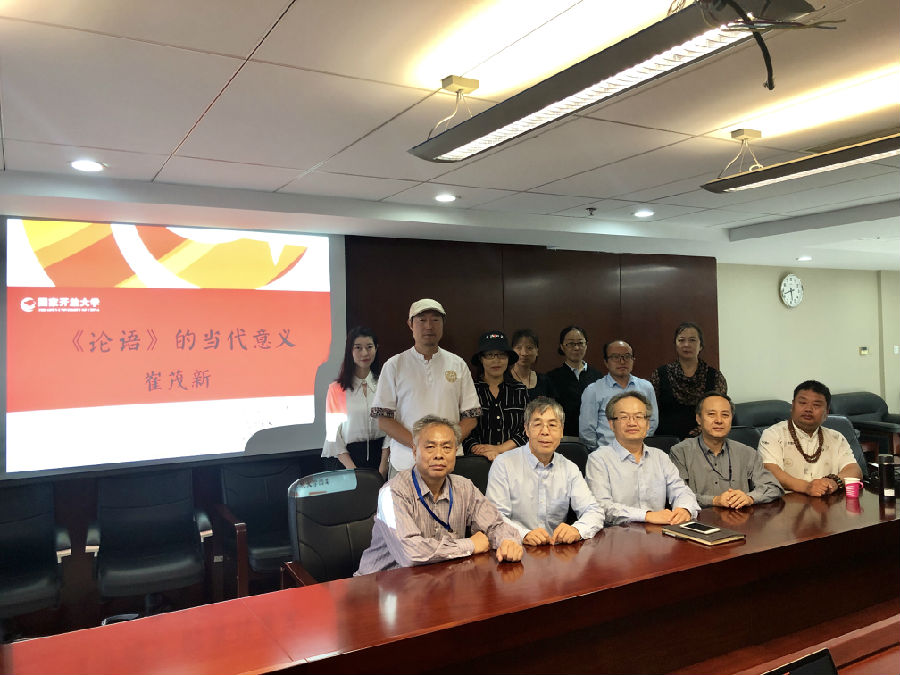 On 20 September 2019, the second Lecture on Traditional Culture was given at the Open University of China (OUC). It was jointly sponsored by the OUC Research Centre for Traditional Chinese Culture, the School of Marxism, and the Committee of the Communist Youth League of China.
On 20 September 2019, the second Lecture on Traditional Culture was given at the Open University of China (OUC). It was jointly sponsored by the OUC Research Centre for Traditional Chinese Culture, the School of Marxism, and the Committee of the Communist Youth League of China.
Professor Cui Maoxin of Qufu Normal University lectured on the “Contemporary Significance of the Analects of Confucius", attracting many fans of The Analects of Confucius (Analects)and some members of the Analects of Confucius community.

Professor Cui said that, even though Analects dates back 2,500 years, its spirit transcends time. In contemporary society, we should oppose false Confucian doctrine in favour of the true spirit and living thought of Confucius.
According to Professor Cui, while Analects is a printed record of the core ideas of Confucius, before it was written these ideas had been widely disseminated by his descendants, including his grandson Zi Si, and had an extensive and profound influence on society, culture and morality. Its value can be summed up by these words from The Doctrine of the Mean: “The movements of such a ruler, illustrating his institutions, constitute an example to the world for ages. His acts are for ages a law to the kingdom; his words are for ages a lesson to the kingdom. Those far from him look longingly for him, while those near him never weary of him.”
In combination with a discussion of Ma Yifu, a master of Chinese studies, Professor Cui summarised Confucian thinking as having three aspects that form a whole: “determination to learn, to be benevolent, and to be an example”. We are all familiar with the phrase, “Is it not pleasant to learn with constant perseverance and application?” For Professor Cui, “learning” means not only recitation and memorisation, but also “in-depth lifelong learning". “Consciousness of life” is fundamental here, with “consciousness” divided into three levels: “perception”, that is, the ability to take appropriate action based on specific situations and times; “awakening”; and “awareness”, which is a process of fulfillment. What one already knows can be the biggest obstacle to learning, the genuine meaning of which, in the Analects, lies in “freedom from wild guesses, arbitrary judgment, blind stubbornness, and self-righteousness”.
Professor Cui stated that “a gentleman should not be like a utensil confined to one use”. People should excel in their roles. He also presented a unique interpretation of “filial piety”, which he says does not mean that parents can make unlimited demands of their children. People should not judge filial piety by way of performance but by way of feeling. True “filial piety” means that “the young inherit the traits of the old”. It represents not only the inheritance of the family line, but the development in the children of the ethics of their culture as passed on to them by their parents.
Professor Cui has made the principles of the Analects part of his own life, and believes that finding contemporary significance in it means living in a spiritual dialogue with Confucius. At the conclusion of the lecture, he again underlined the contemporary value of the Analects as transcending “Confucianism”. The development of the spirit of Confucius is our mission today, and also where the significance of the Analects lies.
Professor Cui Maoxin is an advocate of “Neo-Confucian Cultural Action”, a founder of the public-welfare cultural community based on the Analects, and one of the guides to the study of the Analects at the Chinese Academy of Social Sciences. Over the last 20 years, Professor Cui has devoted himself to the study and popularization of this text, and gained widespread influence by promoting "Neo-Confucianism”. He advocates making the Analects the basis of a way of life.
By Ge Siqing, OUC